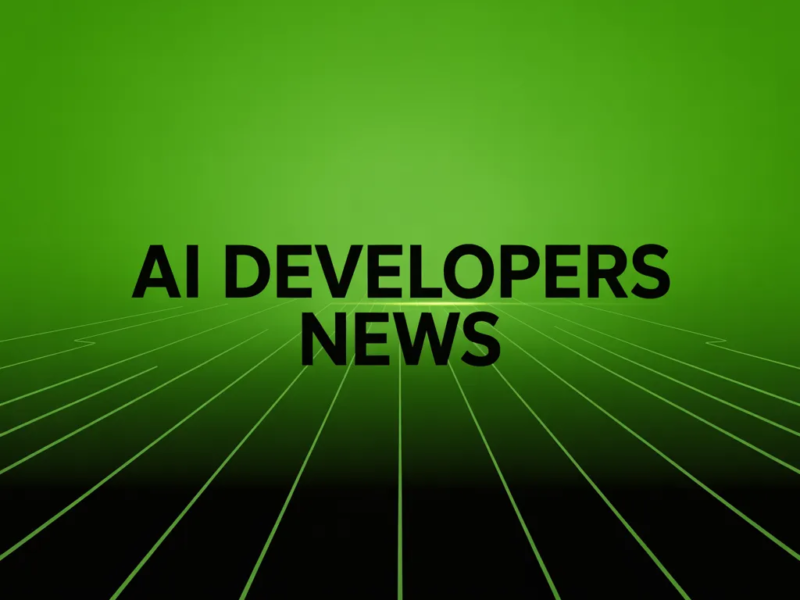In the rapidly evolving landscape of AI-driven automation, Zhipu AI has introduced ComputerRL, a groundbreaking framework designed to empower agents with the ability to navigate and manipulate complex digital workspaces. This innovation addresses a core challenge in AI agent development: the disconnect between computer agents and human-designed graphical user interfaces (GUIs). By integrating programmatic API calls with direct GUI interactions, ComputerRL enables more efficient and versatile desktop operations, marking a significant step toward autonomous computer use agents.
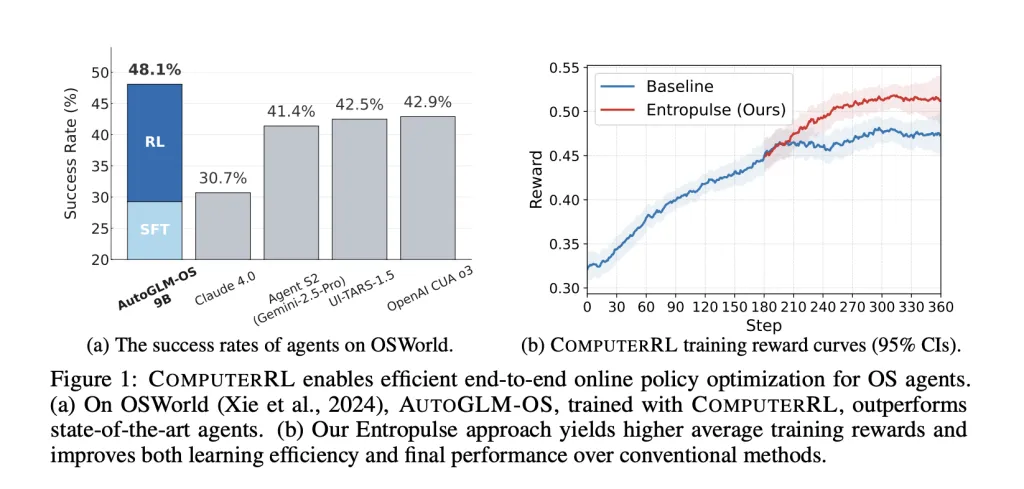
The API-GUI Paradigm: Bridging Human and Machine Interactions
Traditional GUI agents often struggle with environments optimized for human users, leading to inefficient simulations of actions like clicking or scrolling. ComputerRL introduces the API-GUI paradigm, which combines the precision of API invocations with the flexibility of GUI-based operations. This hybrid approach allows agents to leverage machine-friendly APIs for tasks that benefit from programmatic control, while falling back on GUI actions for broader adaptability.
The framework automates API construction using large language models (LLMs). Users provide example tasks, and the system analyzes requirements, implements APIs using relevant Python libraries, and generates test cases. This process ensures APIs encapsulate general-purpose functionalities, reducing complexity and enhancing agent performance. For instance, APIs for Ubuntu applications like GIMP and LibreOffice are integrated, enabling tasks such as image processing or document formatting with fewer steps than GUI-only methods.
Scalable Infrastructure for Large-Scale RL Training
A major hurdle in training desktop agents is the inefficiency of virtual environments. ComputerRL overcomes this with a distributed reinforcement learning (RL) infrastructure built on Docker and gRPC, supporting thousands of parallel Ubuntu virtual machines. This setup is compatible with benchmarks like AgentBench and addresses issues in prior systems, such as resource intensiveness and network bottlenecks.
Key features include lightweight VM deployment via qemu-in-docker, multi-node clustering for scalability, and a web-based monitoring interface. Paired with the AgentRL framework, it enables fully asynchronous training, decoupling data collection from parameter updates to boost efficiency. This infrastructure allows for high-throughput RL, with dynamic batch sizing and off-policy bias mitigation, facilitating extended training runs without stagnation.
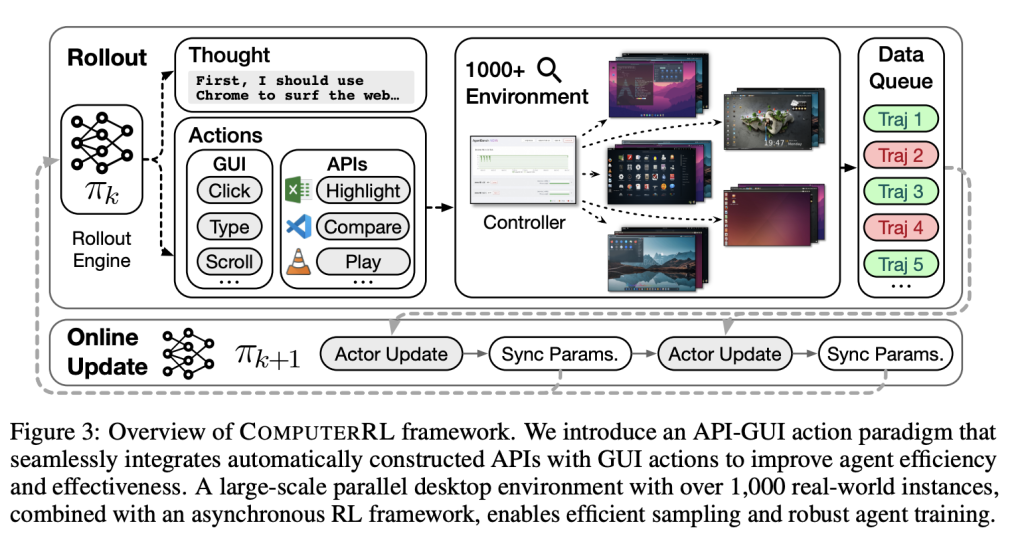

Entropulse: Enhancing RL with Alternating Training Phases
To tackle entropy collapse—a common issue where agents lose exploratory behavior during prolonged RL—ComputerRL incorporates Entropulse. This method alternates RL phases with supervised fine-tuning (SFT) on successful rollout trajectories, restoring entropy and enabling sustained performance gains.
The training pipeline begins with behavior cloning (BC) using trajectories from multiple LLMs for diversity. It then applies step-level Group Relative Policy Optimization (GRPO) with rule-based rewards, assigning positive scores only to correct, contributing actions in successful trajectories. Entropulse intervenes by curating diverse, high-quality data from prior rollouts for SFT, preventing premature convergence and scaling effective training steps.
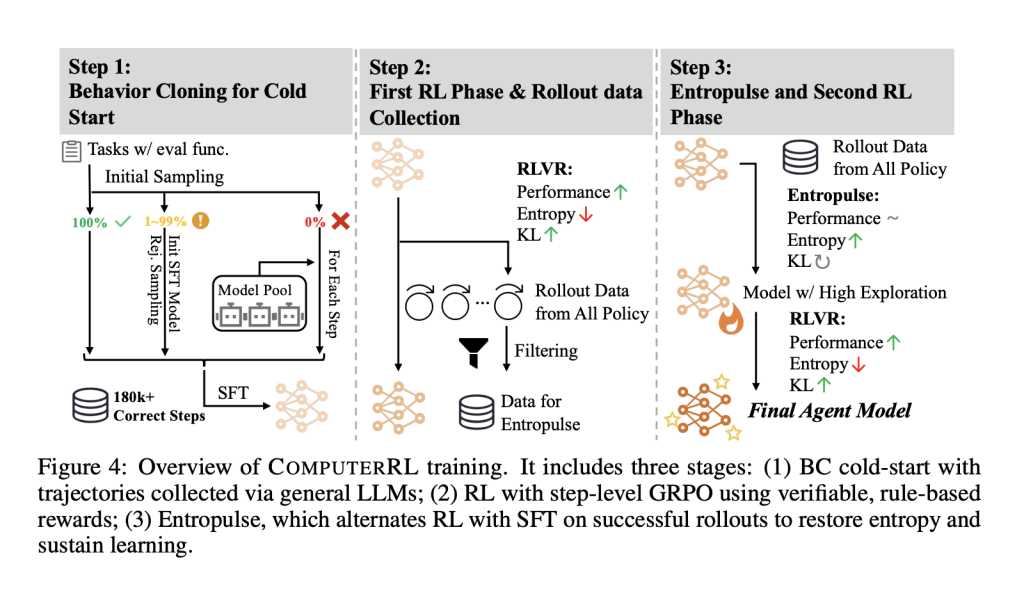

Experimental Validation on OSWorld Benchmark
The research team applied ComputerRL to open-source models like GLM-4-9B-0414 and Qwen2.5-14B, resulting in AutoGLM-OS variants. On the OSWorld benchmark, which evaluates agents in interactive Ubuntu environments, AutoGLM-OS-9B achieved a success rate of 48.1%, surpassing proprietary models like OpenAI’s CUA o3 (42.9%) and Claude 4.0 (30.7%). It also excelled on OSWorld-Verified, scoring 47.3%.
Ablation studies highlight the framework’s strengths. The API-GUI paradigm improved success rates by 134% over GUI-only baselines, particularly in office and professional domains. Training ablations showed BC providing a 31.9% baseline, with RL phases adding up to 45.8% through Entropulse-enabled exploration. Entropy curves confirmed Entropulse’s role in maintaining learning momentum.
Case studies demonstrate practical efficacy, such as creating sales summary tables in LibreOffice Calc or generating system reports via Terminal commands. However, error analysis revealed challenges like visual perception issues (25.8% of failures) and multi-app coordination (34.4%), pointing to areas for refinement.
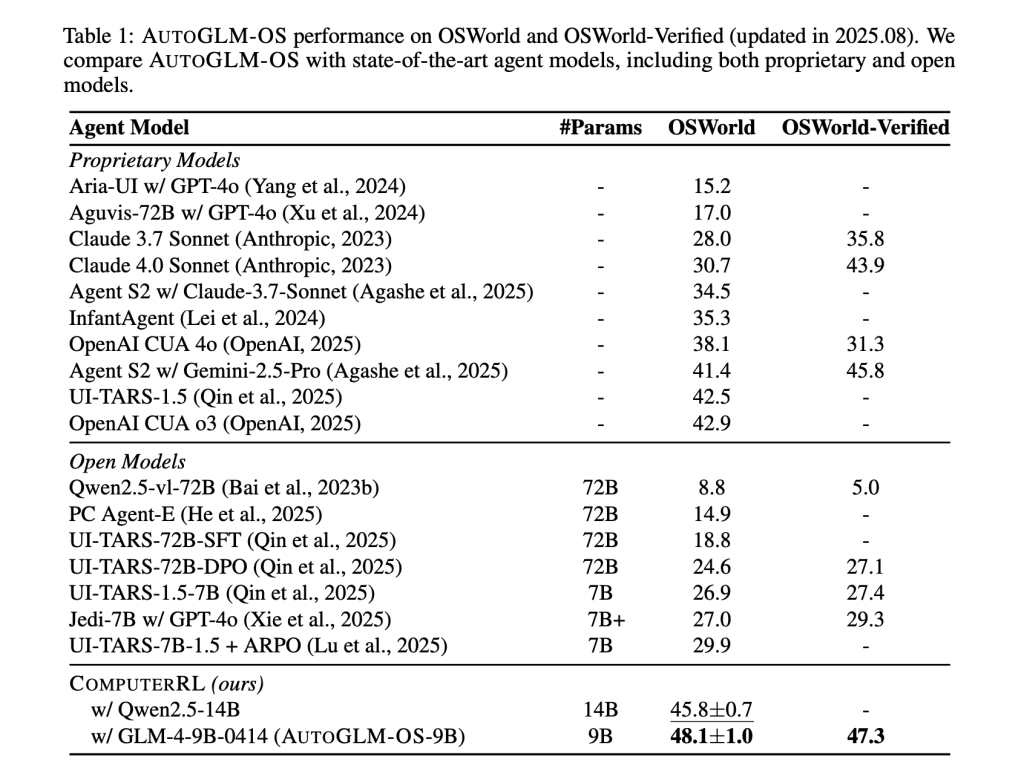

Future Directions in Desktop Autonomy
Looking ahead, ComputerRL sets the stage for more robust agents capable of handling dynamic environments and long-horizon tasks. Potential advancements include expanding training diversity, integrating multimodal perception, and developing hierarchical planning. Safety features like permission frameworks and action validation will be crucial for real-world deployment, ensuring aligned and trustworthy automation.
ComputerRL represents a pivotal advancement in AI agents, blending scalable RL with innovative interaction paradigms to transform desktop intelligence. As open models like AutoGLM-OS push boundaries, this framework paves the way for more capable, general-purpose agents in everyday computing.
Check out the Technical paper here. Feel free to check out our GitHub Page for Tutorials, Codes and Notebooks. Also, feel free to follow us on Twitter and don’t forget to join our 100k+ ML SubReddit and Subscribe to our Newsletter.
Asif Razzaq is the CEO of Marktechpost Media Inc.. As a visionary entrepreneur and engineer, Asif is committed to harnessing the potential of Artificial Intelligence for social good. His most recent endeavor is the launch of an Artificial Intelligence Media Platform, Marktechpost, which stands out for its in-depth coverage of machine learning and deep learning news that is both technically sound and easily understandable by a wide audience. The platform boasts of over 2 million monthly views, illustrating its popularity among audiences.

